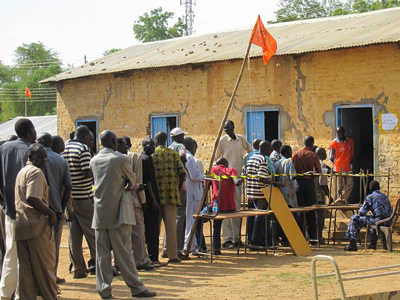
This post originally appeared on Foreign Policy.
Sudan is voting in its first national elections in over 20 years, and the process is playing out much as one might expect, given that the country’s ruling National Congress Party is led by accused war criminal President Omar Hassan al-Bashir. Much of the international reporting so far has focused on the numerous irregularities and technical glitches that have become apparent as voting unfolds, almost all of which (surprise!) seem to favor the ruling party. But this is an election that was effectively stolen long ago, as the Sudanese government steadfastly refused to implement the provisions of the 2005 Comprehensive Peace Agreement that were supposed to create a free and fair environment for elections. Instead, press freedoms remain badly curtailed; the dreaded national security service still detains opposition figures at will; freedom to publicly assemble is denied; and everything from voter registration to the printing of ballots has been skewed to assist Bashir in his desire to stage-manage an election without actually risking a fair vote.
For veteran Sudan watchers, none of this comes as much of a shock. Analysts looking for democratic upsides have had to console themselves with the few examples in which opposition groups have gained a toehold of political space to publicly question the regime. What is more surprising, however, has been the muddled and squeamish posture of U.S. President Barack Obama’s administration toward Sudan’s election—one that underscores a larger, ongoing struggle to place democracy promotion effectively within the context of U.S. foreign policy more broadly.
Obama’s special envoy for Sudan, retired Maj. Gen. J. Scott Gration, no stranger to gaffes, triggered his most recent bout of eye-rolling in both Sudan and Washington when he emerged from a meeting with the National Election Commission 11 days ago and declared that the commission’s members had given him "confidence that the elections will start on time and they would be as free and as fair as possible." The comments were unfortunate enough by themselves, but their timing also conspired against them; Gration spoke just as increasing numbers of opposition parties and candidates were either boycotting the election completely or pulling out of the presidential contest—as did the largest party in South Sudan — because the election was transparently neither free nor fair.
Why the rose-colored glasses from the special envoy? Gration is clearly eager to view this election as a necessary benchmark, a box to check, on the road to the broader issue of independence for South Sudan, which will be determined in a January 2011 referendum. Any suggestion that Sudan’s election was flawed could provoke Bashir to try to disrupt the January referendum, Gration fears, and indeed, Bashir has made threats to this effect. Still, the imperatives of his short-term diplomacy seemed to be at odds with the long-term goal of transforming Sudan into a freer and more democratic place.
Here is where we see some interesting parallels with two other recent elections, both initially mishandled by the administration: those in Afghanistan and Iran. In all three cases, the administration seemed reluctant to acknowledge upfront that the elections were profoundly flawed, even though it had more than enough evidence to that effect. In all three cases, the administration moved only slowly to toe a tougher line — after widespread howls from human rights activists, opposition parties in the respective countries, the media, and Republican critics were heard first.
Click here to continue reading.

